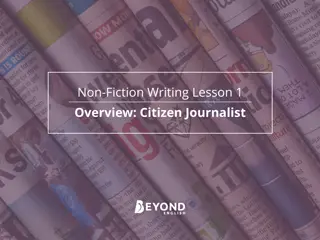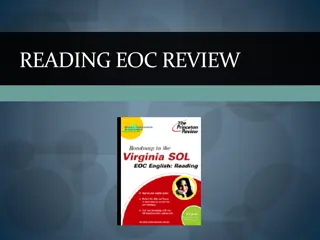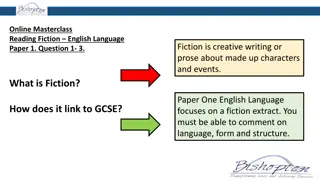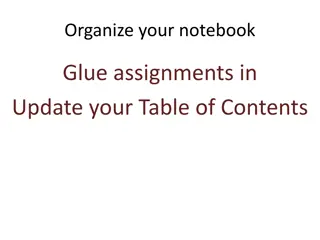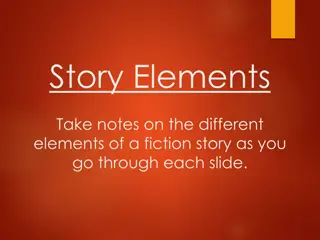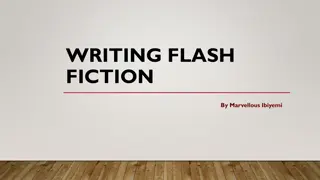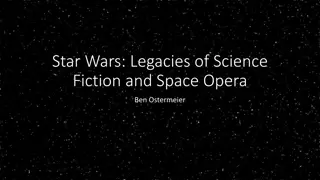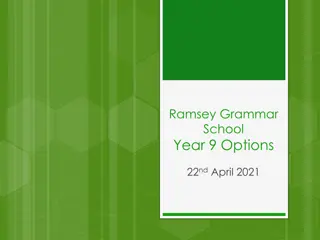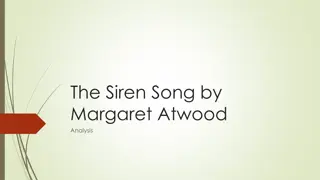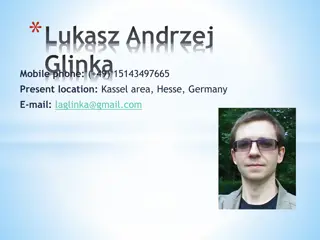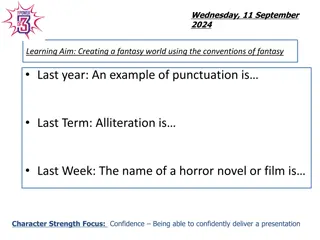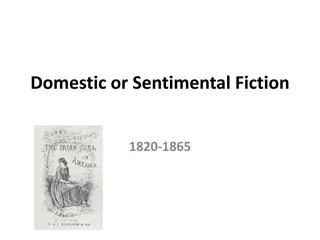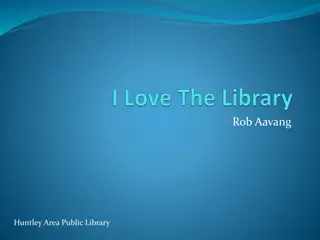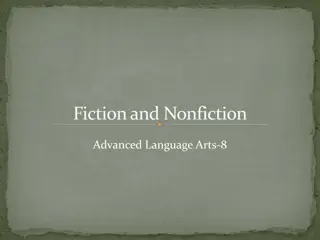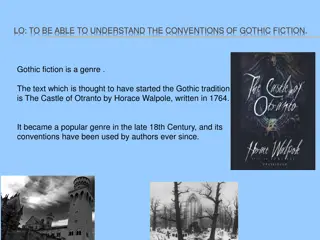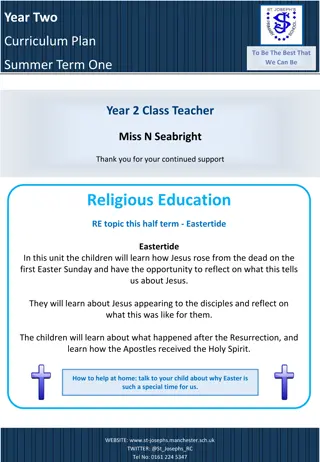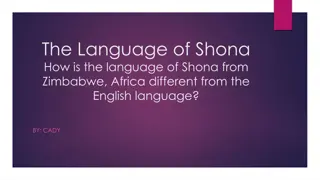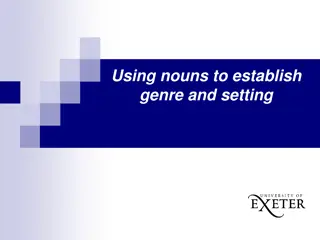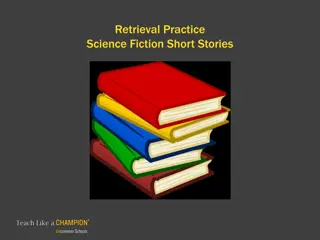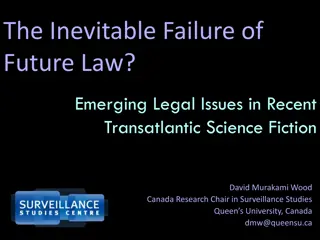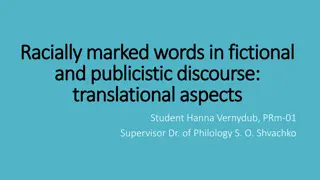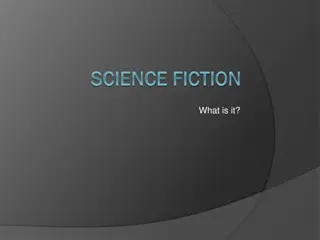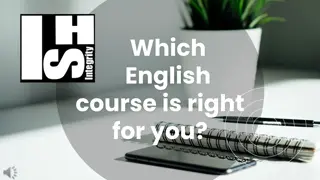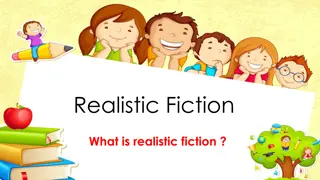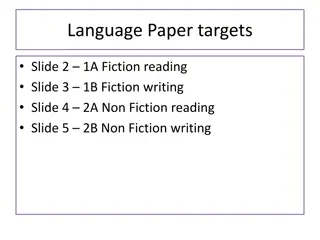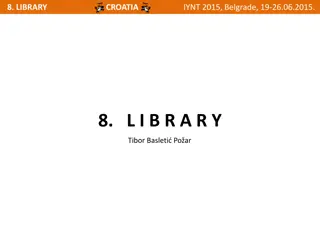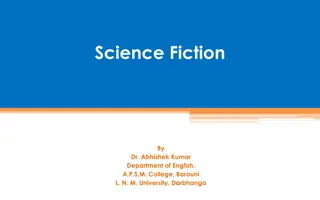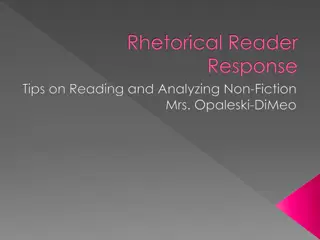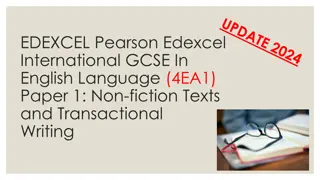Citizen Journalism and Non-Fiction Writing
Explore the world of citizen journalism and non-fiction writing, learning about text types, adapting writing to conventions, considering audience, purpose, and tone. Discover the significance and usefulness of non-fiction writing, and delve into creating various text types. Uncover the role of citiz
2 views • 11 slides
Reading EOC Review: Test Structure, Types of Selections, and Breakdown
The Reading EOC Review covers the test makeup, types of reading selections, and breakdown of questions and content to help you prepare effectively. The test comprises sections with 55 scored questions to be answered, focusing on functional literacy and narrative/fiction elements, including poetry, p
8 views • 26 slides
Fiction Through Text Analysis: Paper 1 English Language Masterclass
Delve into the world of fiction through an analysis of the novel "Girl With a Pearl Earring". Explore how language, form, and structure are used in the extract to captivate readers. Discover the characters, setting, and narrative techniques employed by the writer to engage and intrigue readers. Unco
5 views • 7 slides
Evolution of English Literature: From Old English to Beowulf
The English language, evolving over 1,400 years, transitioned from Old English to Middle English with works like Beowulf standing as a pinnacle of Old English literature. The epic poem tells the tale of Beowulf's heroic feats in pagan Scandinavia, showcasing elements of alliteration, a key literary
0 views • 46 slides
Historical Fiction: Elements and Examples
Discover the essence of historical fiction, its key elements, and examples like "Forrest Gump." Learn how plausibility and interpretation play pivotal roles in creating captivating narratives that blend fiction with historical events.
1 views • 11 slides
Spring 2015 English 110 Final Exam Information
Spring 2015 English 110 Final Exam includes an Essay Final Exam to be completed by May 21st and an Objective Final Exam on May 27th or May 28th. The Essay Final consists of flash fiction tasks, literary criticisms, and analysis, while the Objective Final covers fiction elements identification and an
0 views • 7 slides
Essential Elements of Fiction Storytelling
Dive into the key components that make up a compelling fiction story, including plot development, setting, mood creation, character conflicts, and the use of imagery and dialogue to enhance the reader's experience. Explore these foundational elements to enhance your storytelling skills.
2 views • 36 slides
Crafting Compelling Flash Fiction: Techniques and Examples
Dive into the world of flash fiction with this informative piece detailing the essence, types, and techniques of writing succinct yet gripping stories. Learn how to hook readers from the start, use impactful scenes over summaries, and create lasting impressions with minimal words.
0 views • 18 slides
Influential Works in Science Fiction and Space Opera Literature
Explore the significant influence of classic science fiction novels like "War of the Worlds," "A Fighting Man of Mars," "Second Foundation," "2001: A Space Odyssey," and "Children of Dune" on the creation of iconic space opera narratives such as Star Wars. Delve into the themes, settings, and charac
0 views • 16 slides
Importance of Teaching English at Different Education Levels
English language holds a significant position in the educational system and national life of India. This presentation by Dr. A. Mary Delphine highlights the aims and objectives of teaching English, emphasizing its importance in India and the modern world. The objectives include understanding the rat
1 views • 32 slides
English Language Cambridge IGCSE Course Overview
Students of the Ramsey Grammar School Year 9 English Language Cambridge IGCSE course will engage in reading and analyzing various fiction and non-fiction texts, honing comprehension skills, crafting written pieces with clarity and purpose, and enhancing their ability to summarize and re-imagine cont
1 views • 7 slides
Margaret Atwood's Analysis of "The Siren Song
Margaret Atwood, a renowned Canadian author, delves into the plight of humans through speculative fiction with elements of dystopia and science-fiction. She is an environmentalist who addresses issues like global warming in her works. Atwood's writing style includes free verse poetry with enjambment
16 views • 18 slides
Lukasz Andrzej Glinka - Non-fiction Writer and Science Author with a Diverse Academic Background
Lukasz Andrzej Glinka is a prolific non-fiction writer and science author known for his extensive publication record, academic achievements, and editorial contributions. With a background in theoretical physics and a wealth of experience at prestigious research institutions worldwide, he has establi
0 views • 6 slides
Ernest Hemingway: A Brief Overview of His Life and Works
Ernest Miller Hemingway, born on July 21, 1899, was a renowned American novelist, short story writer, and journalist who left a significant mark on 20th-century fiction. Hemingway's distinct writing style and adventurous life influenced many generations. He produced numerous iconic works, including
0 views • 20 slides
Fantasy Worlds: Conventions, Types, and Challenges
Dive into the realm of fantasy literature and learn about the conventions, types, and differences between fantasy and sci-fi. Uncover the definition of fantasy, explore popular genres, and discover sub-genres like fiction, science fiction, and historical fiction. Engage in thought-provoking challeng
0 views • 17 slides
Washington Irving: Father of American Fiction and Pioneer of American Romanticism
Washington Irving, an influential American author of the early 19th century, is revered as the Father of American fiction. Known for iconic works like "The Legend of Sleepy Hollow" and "Rip Van Winkle," Irving played a crucial role in establishing American literature as an independent art form. His
1 views • 14 slides
Mysterious Encounters: Science Fiction Stories
As the sun sets, strange occurrences unfold in different worlds - from encountering aliens in a forest to a console explosion in an empire facing an energy crisis. Journey into the realms of science fiction with intriguing characters, futuristic settings, and unexpected dilemmas that will keep you h
0 views • 14 slides
Exploring the World of Domestic and Sentimental Fiction (1820-1865)
Discover the world of domestic and sentimental fiction that captivated women during the 19th century in America. Dive into the plots, characters, and themes that defined this influential genre, exploring the journey of young heroines facing trials, triumphs, and the importance of self-mastery.
0 views • 15 slides
Rob Aavang Huntley Area Public Library Review and Rating
Reasons to love the library include books, movies, online resources, great staff, and computer classes. The individual expresses their feelings at the library and how they feel when leaving. They typically check out non-fiction books, movies, and fiction. Two ratings are provided for customer servic
0 views • 8 slides
Rutherford High School Curriculum Overview
Rutherford High School offers a comprehensive curriculum ranging from English to Mathematics. The curriculum night provides an overview of courses offered, course selection process, and graduation requirements. Students must complete four years of English and Mathematics, including specific assessme
0 views • 37 slides
Fiction and Nonfiction in Language Arts
Fiction and nonfiction are two key genres in literature. Fiction involves imaginative storytelling with elements like plot, characters, setting, point of view, and theme. Nonfiction, on the other hand, deals with real people, events, and ideas, aiming to inform, persuade, or entertain readers. Explo
0 views • 14 slides
Gothic Fiction Conventions in Literature
Gothic fiction is a captivating genre rooted in dark, mysterious settings, supernatural elements, and eerie atmospheres. Originating with "The Castle of Otranto" by Horace Walpole, this genre has evolved to encompass elements like family curses, isolated castles, and sinister creatures. Dive into th
0 views • 25 slides
Year 2 Curriculum Plan for Summer Term - Be the Best That We Can Be
Year 2 Curriculum Plan for Summer Term involves various subjects and activities aimed at providing a well-rounded educational experience for the students. The plan includes topics such as Religious Education focusing on Eastertide, English writing featuring fiction and non-fiction texts, reading com
0 views • 4 slides
Contrasting Shona and English Languages in Zimbabwe
The language of Shona in Zimbabwe, Africa, differs from English in various aspects such as script symbols, alphabet, official usage, borrowing of words, and number of speakers. Shona has a script with 35 symbols, while English has a 26-letter alphabet. English is the official language of the USA, wh
0 views • 5 slides
Creative Noun Usage in Science Fiction Writing
Explore the art of using nouns to establish genre, setting, and character names in science fiction writing. Learn how authors like Philip Reeve utilize proper nouns to create immersive worlds and unique characters. Delve into the significance of authentic text, discussion, and purposeful learning pr
0 views • 10 slides
Science Fiction Retrieval Practice: Short Stories Insights
Explore futuristic technologies, incongruity, and speculative fiction elements in science fiction short stories like "Robbie" and "There Will Come Soft Rains." Uncover the connections to historical events, like the Cold War, through literary analysis of these captivating narratives.
0 views • 16 slides
Influence of Indian English in "The Jewel in the Crown" by Rochana Jayasinghe
Indian English plays a significant role in the Indian subcontinent with 200 to 333 million English speakers. India is a key player in the English language landscape, publishing more books in English than any other language. The British Raj from 1858 to 1947 shaped the prominence of English in India,
0 views • 18 slides
Legal Themes in Science Fiction: The Inevitable Failure of Future Law
This study delves into emerging legal issues in recent transatlantic science fiction works by authors like Charles Stross, Ken McLeod, and Paolo Bacigalupi. It examines the portrayal of law in SF and what insights it offers about our legal systems. Through a systematic survey of over 300 novels and
0 views • 12 slides
Racially Marked Words in Fiction and Journalism
This study delves into the linguistic features of English racial vocabulary in journalistic and literary texts, along with its translation into Ukrainian. It examines the historical development of racial segregation ideas, linguistic status of racially marked vocabulary in English, characteristics o
0 views • 14 slides
GCSE English Language and Literature Overview
GCSE English Language and Literature subjects are led by Mrs. A. Baker and Mr. Doodson. English Language is examined by OCR, while English Literature is examined by Edexcel. Both subjects have two examination papers worth 100% of the grade. English Language papers focus on reading and writing skills
0 views • 14 slides
Exploring the World of Science Fiction
Science fiction is a genre that delves into imagined future scientific and technological advances, exploring major societal and environmental changes, space travel, time travel, and life on other planets. It combines elements of science and fiction to create believable yet captivating narratives tha
0 views • 14 slides
Choosing the Right English Course for Your HSC: Advanced, Standard, or Studies?
When preparing for the HSC, selecting the appropriate English course is crucial as it is compulsory. Options include Advanced English, Standard English, and English Studies, each offering unique benefits. Advanced English challenges students with higher-order thinking skills, while Standard English
0 views • 25 slides
Realistic Fiction: Features and Examples
Realistic fiction is a genre of writing that portrays characters, settings, and events that could exist in real life, even though the story itself may be fictional. The key features include believable characters, realistic settings, everyday problems, and plausible solutions. By sorting book covers
0 views • 9 slides
Language Paper Targets for Fiction and Non-Fiction Reading and Writing
This content provides detailed targets for Language Papers, focusing on Fiction and Non-Fiction reading and writing skills. It covers strategies such as being specific in analysis, using evidence from texts, improving sentence structures, enhancing vocabulary usage, and applying language techniques
0 views • 14 slides
Ambitious Plan to Download and Organize English Fiction on a USB Stick
One ambitious individual aims to download all English fiction onto a single USB stick, facing challenges of finding, compressing, and indexing the text files. The plan involves downloading free books from platforms like Project Gutenberg, compressing them, and creating an index with unique categorie
0 views • 19 slides
Evolution of Science Fiction Literature
Science fiction genre, blending imaginative fantasy with scientific principles, has evolved significantly over time. Initially emerging in the late 1800s, it gained popularity alongside technological advancements. Theodore Sturgeon highlighted the essence of human stories within the genre. Iconic wo
0 views • 8 slides
Effective College Reading and Analysis Strategies for Non-Fiction Texts
Enhance your non-fiction reading and analysis skills with these practical tips: prepare yourself mentally before reading, preview the article, highlight key points while reading, monitor comprehension, and summarize the article afterward. Additionally, learn how to create a rhetorical précis to eff
0 views • 19 slides
Non-fiction Texts and Transactional Writing in English Language
This content outlines a detailed overview of the Edexcel Pearson Edexcel International GCSE in English Language (4EA1) Paper 1, focusing on non-fiction texts and transactional writing. It includes sections on reading comprehension, inference questions, and transactional writing tasks, providing guid
0 views • 30 slides
Fictional Genres: Mystery, Historical, and More
Dive into the captivating world of fiction with its various genres like Mystery, Historical fiction, Realistic fiction, Science fiction, Folk tales, Myth, and Fairy tales. Discover how these genres transport you to different realms, from unraveling mysteries to exploring imagined pasts and futures f
0 views • 13 slides
NYSCA Literature Program 2019 Guidelines
The NYSCA Literature Program for the year 2019 provides support for literary works in genres like fiction, poetry, drama, and creative non-fiction. This program aims to assist in the creation, publication, and presentation of literary writing, including translations into English. Important dates, gu
0 views • 22 slides
